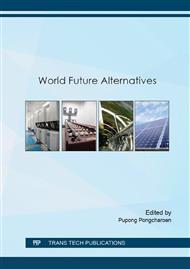[1]
Demirbas, A. (2008). Biofuels: Securing the planet's future energy needs. New York : Springer Science and Business Media.
Google Scholar
[2]
Dicks, M. R., Campiche, J., Ugarte, D. D., Hellwinckel, C., Bryant, H. L., & Richardson, J. W. (2009). Land use implications of expanding biofuel demand. Journal of Agricultural and Applied Economics, 41 (2), 435 – 453.
DOI: 10.1017/s1074070800002911
Google Scholar
[3]
Fjerbaek, L., Christensen, K. V., & Norddahl, B. (2009). A review of the current state of biodiesel production using enzymatic transesterification. Biotechnology and Bioengineering, 102 (5), 1298-1315.
DOI: 10.1002/bit.22256
Google Scholar
[4]
Giertz, J. F. (2005). Exercise taxes. In J. J. Cordes, R. D. Ebel, & J. Gravelle (Eds. ), The encyclopedia of taxation and tax policy (pp.125-127). Washington, DC : The Urban Institute.
Google Scholar
[5]
Hilyard, J. (2012). The oil and gas industry : A nontechnical guide. Tulsa, OK: Penn Well Corporation.
Google Scholar
[6]
Hochman, G., Rajagopal, D., & Ziberman, D. (2010). Are biofuels the culprit? OPEC, food and fuel. The American Economic Review, 1000 (2), 183-187.
DOI: 10.1257/aer.100.2.183
Google Scholar
[7]
Hochman, G., Rajagopal, D., & Zilberman, D. (2001). The effect of biofuels on the international oil market. Applied Economic Perspectives and Policy, 33 (3), 402-427.
DOI: 10.1093/aepp/ppr016
Google Scholar
[8]
International Institute for Sustainable Development. (2013).
Google Scholar
[9]
Irawan, S., & Heikens, A. (2012).
Google Scholar
[10]
Jenvanitpanjakul, P. (2007). Usage of biodiesel in Thailand and future technological issues. Retrieved from The 5th JCAP Conference Program : http: /www. pecj. or. jp/english/ jcap/jcap2/pdf/5th/2-2-3_Jenvanitpanjakul. pdf.
Google Scholar
[11]
Karrenbrock, J. D. (1991). The behavior of retail gasoline prices : Symmetric or not? Feferal Reserve Bank of St. Louis Review, 73(4), 19-29.
DOI: 10.20955/r.73.19-29
Google Scholar
[12]
Levi, M. D. (2009). International finance. New York : Routledge.
Google Scholar
[13]
Maples, R. E. (2000). Petroleum refinery process economics. Tulsa, OK : PennWell.
Google Scholar
[14]
Pahl, G. (2008). Biodiesel : Growing a new energy economy (2nd ed. ). White River Junction, VT : Chelsea Green Publishing.
Google Scholar
[15]
Phalakomkule, C., Petiruksakul, A., & Puthavithi, W. (2009). Biodiesel production in a small community : Case study in Thailand. Resources, Conservation and Recycling, 53 (3), 129-135.
DOI: 10.1016/j.resconrec.2008.10.001
Google Scholar
[16]
Sarin, A. (2012).
Google Scholar
[17]
Thommanomai, A. (2014). Thailand biofuel policies. Retrieved from International Energy Agency : http: /www. iea. org/media/technologyplatform/workshops/southeastasiabioenergy2014/ Thailand. pdf.
Google Scholar
[18]
Tokgoz, S., Elobeid, A., Fabios, J., Hayes, D.J., Babcock, B.A., Yu, T.H., et al. (2008). Bottlenecks, drought, and oil price spikes : Impact on US ethanol and agricultural sectors. Applied Economic Perspectives and Policy, 30(4), 604-622.
DOI: 10.1111/j.1467-9353.2008.00436.x
Google Scholar
[19]
Triyanond, S. (2013). Updates on Thailand's biodiesel industry. Retrieved from Palmex Thailand. http: /www. thaipalmoil. com%5B3%5DMr. Sanin%20Triyanond%20Updates%20on%20 Thailand%27s%20Biodiesel%20Industry_Final%20%282%29. pdf.
Google Scholar
[20]
Venter,A., van der Wald, C., Plutiagae,K., Khalo,T., van Niekerk, D., &Neale,E. (2007). Municipal management : Serving the people. Cape Town, South Africa: Juta & Company.
Google Scholar
[21]
Vikitset,T. (2008). An alternative retail pricing policy for petroleum products : A case study of gasoline and high speed diesel in Thailand. School of Development Economics. Bangkok : National Institute of Development Administration.
Google Scholar
[22]
Vikitset,T. (2013).
Google Scholar
[23]
Yusuf, N. N., Kamarudin, S.K., & Yaakub,Z. (2011). Overview on the current trends in biodiesel production. Energy Conversion and Management, 52 (7), 2741-2751.
DOI: 10.1016/j.enconman.2010.12.004
Google Scholar


